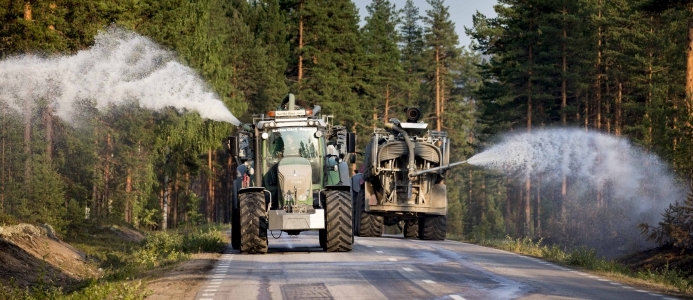Wildfires are causing catastrophic damage across Europe

Unusually hot and dry weather in Europe has created ideal conditions for wildfires, with Greece, Sweden and Latvia particularly effected.
The European Commission’s Emergency Response Coordination Centre is working with local authorities of Greece, Sweden and Latvia to support their operations. Numerous other European countries are also supporting the affected areas.
Greece
Greece experienced an unusually dry winter which is emerging as a key factor in the wild fires that are currently burning in the country.
A lack of rain meant that groundwater levels failed to recharge and vegetation was left unable to recover from the high temperatures of 2017. These conditions, combined with strong winds, have allowed the wild fires to spread rapidly before fire-fighters could gain control.
The unusual weather conditions are widely believed to be driven by climate change
Nikos Charalambides, Executive Director of Greenpeace Greece noted:
“As the death toll rises and the full size of the disaster is still to be recorded, it would be premature to attribute these [fires] to either climate change or the failures of the fire prevention and fire-fighting mechanisms.”
So far the fires are known to have killed 74 people and injured 200, hundreds more have been forced to flee their homes and seek refuge from the flames in the sea. The death toll is expected to rise as search and rescue operations continue. Greece has declared a state of emergency and three days of national mourning.
There have also been reports of remarkable rescues, for example coast guards have so far saved 696 people who had fled to beaches, while boats pulled another 19 people alive from the sea.
Greece has activated an EU agreement and has requested help from member states. Cyprus has dispatched a military plane with 60 firefighters, Spain has dispatched two water dropping planes and other countries, including Turkey, Israel and Italy have also offered planes and helicopters to help.
Commissioner for Humanitarian Aid and Crisis Management Christos Stylianides, who has travelled to Athens, commented:
"Today is a day of great sorrow for Greece and for all of Europe. The EU stands with the Greek people in solidarity at this difficult time”
Greek authorities have urged residents in a coastal region west of Athens to abandon their homes as the fire closed one of Greece’s busiest motorways and halted trains.
Sweden
Forest fires in Sweden are spreading as far north as the Arctic Circle and caused authorities to appeal for international assistance.
Hot weather and drought conditions are thought to be the main causes of the fires and the national weather service has issued fire warnings for almost the entire country. On Wednesday afternoon 44 fires were burning from Lapland in the north to the southern island of Gotland.
Italy have contributed to the relief efforts having sent two ‘waterbombers’ which can carry 6,000 litres of water at one time. The aircraft are manned by 13 people.
Norway has also dispatched 10 helicopters to assist its neighbouring country despite also being on high alert for wildfires itself.
Many people have been evacuated from their homes and others have been advised to shut all ventilation to protect from the fire’s smoke.
A record of nine public warnings have been issues so far.
Christos Stylianides commented:
"The European Union stands in full solidarity with Sweden. Our thoughts are with all the people affected and also with first responders and the firefighters working to tackle the fires. I thank Italy for its immediate offer of two planes. This is solidarity in a Europe that protect”
Latvia
Fires have destroyed over 2,000 acres of land in western Latvia, the country is also suffering due to usually high temperatures and lack of rain.
Latvia has also appealed for international assistance, requesting support from Belarus due to stretched European Union resources.
Belarus and Lithuanian have both offered support in tackling the fires by sending helicopters.
The European Union’s Copernicus Satellite system has been activated to assist Latvian authorities in mapping the at risk areas.
Join us for the 10th Anniversary AIDF Global Summit on 5-6 September in Washington D.C to discuss global challenges such as changing weather patterns, natural disasters and climate change.
If you’d like to stay informed on the latest updates in aid and development, please sign up for the AIDF newsletter.
Image credit: European Commission










